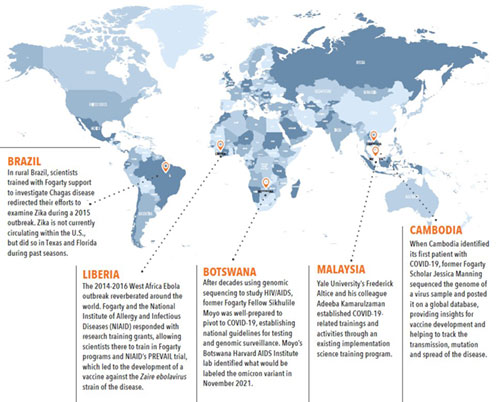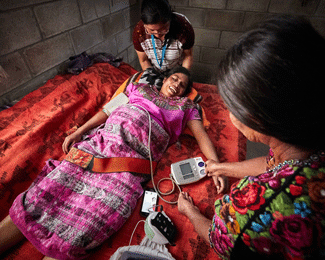Our Role in Global Health
Fogarty makes foundational investments in the scientific workforce and develops global research networks that can quickly respond to emerging challenges while harnessing new tools and research approaches. Fogarty also serves as the focal point for coordination of international engagement at NIH.
Investing in the scientific workforce
Central to Fogarty's mission is its focus on preparing the next generation of scientists to respond to current and future threats to health by providing them with opportunities to tie their biomedical research to real world applications. Nearly 8,500 individuals from 132 countries have trained through Fogarty programs since 1989. After completing their training, these individuals have gone on to become independent investigators, lead groundbreaking research studies, and contribute to significant scientific achievements.
 Fogarty International Center
Strengthening Global Health Workforce: Map highlighting Fogarty International Center's impact in strengthening of the global health workforce.
High-resolution image [JPG, 2 MB]
Fogarty International Center
Strengthening Global Health Workforce: Map highlighting Fogarty International Center's impact in strengthening of the global health workforce.
High-resolution image [JPG, 2 MB]
Program spotlight: The Global Health Program for Fellows and Scholars, recently renamed the
Launching Future Leaders in Global Health Research Training Program (LAUNCH), supports mentored research training for early career researchers in global health at established biomedical and health research institutions and project sites in low- and middle-income countries (LMICs). This program, which recently celebrated its 20th anniversary, is implemented by seven consortia of U.S. universities. There are nearly 1,450 alumni from the program who are now leaders in a wide variety of health-related fields.
Trainee spotlight: Former Fogarty Global Health Fellow and Emerging Global Leader Dr. Eric Nelson created MotoMeds, an
innovative pediatric telemedicine and medication delivery service in Haiti and Ghana.
Fact sheet: Strengthening the global health research workforce [PDF]
Fact sheet:
Advancing science for global health [PDF]
Fostering collaborative global networks
Across our scientific portfolio, Fogarty supports networks of U.S. and international scientists who collaborate across borders and can rapidly respond to new and emerging health threats.
Program spotlight: Fogarty supports the
African Forum for Research and Education in Health (AFREhealth), a leadership and convening organization that brings academic health research professionals together to develop and share best practices, innovations, curricula, and policy. The powerful network was designed to address health workforce issues and the HIV/AIDS crisis. However, when the COVID-19 pandemic hit, the network rapidly pivoted to help identify and share best practices for dealing with the pandemic across Africa.
Harnessing innovation
Fogarty leverages several cutting-edge research approaches to respond to our changing world.
 Courtesy of Bryan Watt, Photograpers Without Borders
Courtesy of Bryan Watt, Photograpers Without Borders
Program spotlight: Through support from the NIH Common Fund and in partnership with 10 NIH Institutes, Centers, and Offices, Fogarty helped launch the
Harnessing Data Science for Health Discovery and Innovation in Africa (DS-I Africa) program. DS-I Africa supports an African-led consortium that will employ innovative approaches such as big data analysis, artificial intelligence, and computational modeling to transform health in Africa. The program recently awarded new Partnership for Innovation Research Projects for new and early-stage African investigators who are using tools like mobile microscopy, artificial intelligence, and geospatial analysis to address health challenges such as malaria, heart disease, and pediatric HIV. In conjunction, new Research Education projects are supporting state-of-the-art courses for data science skill development
Program spotlight: Fogarty's
Mobile Health: Technology and Outcomes in LMICs (mHealth) program implements an innovative two-phase funding approach that emphasizes rigorous evaluations at the proof-of-concept stage followed by opportunities for scaling up only the interventions that are proven effective. Grantees from this program are using tools such as machine learning, artificial intelligence, low-cost imaging, and mobile apps to address cancer diagnosis, hypertension, mental health, and many other health challenges. Over the past eight years, the program has supported digital health research in 42 LMICs, resulting in 269 publications and five patent applications. Two grantees have gone on to win first place in the
NIH Technology Accelerator Challenge for innovations developed from their mHealth grant.
Preparing for future pandemics
Fogarty's foundational investments in the scientific workforce and global networks promise to be effective against future pandemics. Fogarty's
Division of International Epidemiology and Population Studies (DIEPS) further supports pandemic preparedness through its ongoing research and research training on epidemiological modeling and genomic epidemiology.
Fogarty's investments in the scientific workforce and collaborative networks contributed to the ability of researchers around the world to quickly respond to the COVID-19 pandemic. Past and current
grantees and trainees played a significant role in the COVID-19 response in Haiti, Peru, South Africa, and many other countries while rising to leadership positions and providing expert analysis to policymakers. Building on these experiences, the Fogarty network of U.S. and international scientists is even more prepared to collaborate across borders and is positioned to rapidly respond to new and emerging outbreaks and pandemics.
DIEPS serves as Fogarty’s in-house research team and is a leading partner for the
COVID-19 Scenario Modeling Hub and
Flu Scenario Modeling Hub, two academic/government consortia that use advanced computational models to forecast the spread of SARS-CoV-2 and influenza variants in the U.S. to guide federal and local health authorities, public health experts, and the general public. The scenario hubs’ forecasts informed the expansion of the primary COVID-19 vaccine schedule to school-age children in 2021 as well as booster recommendations in fall 2022. These experiences, capabilities, and networks can be quickly mobilized to respond to new infectious disease threats.
Trainee spotlight: Current and former Fogarty grantee
Dr. Christian Happi sequenced the first SARS-CoV-2 strain identified in Nigeria during the pandemic and is now leading research on a variety of infectious diseases as the director of the African Center of Excellence for Genomics of Infectious Diseases (ACEGID).Former Fellow
Dr. Sikhulile Moyo discovered the omicron variant in Botswana and continues to lead research as the director of the Botswana-Harvard AIDS Partnership lab. Their labs can sequence genomes of pathogens in-country instead of sending samples abroad, which allows them to trace outbreaks and inform public policy more rapidly.
Updated March 17, 2025